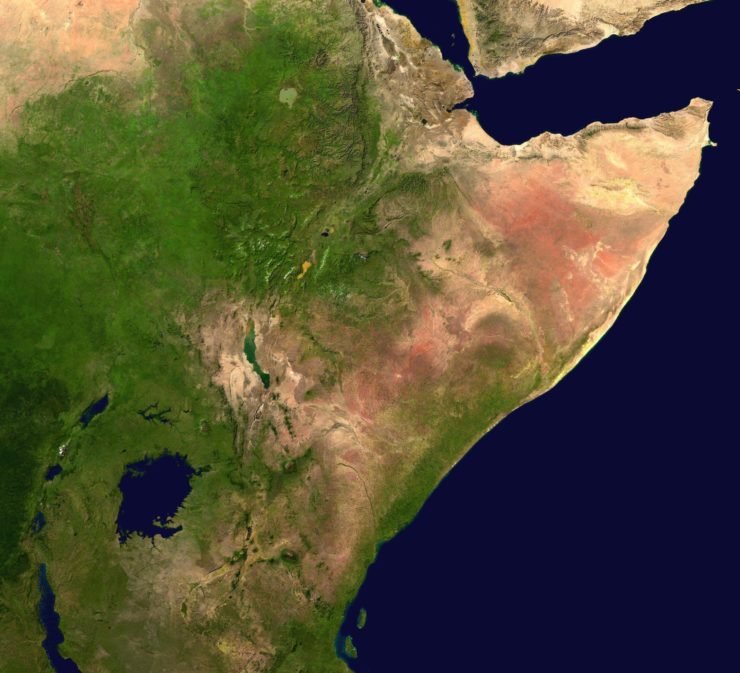
The beginning of 2024 for the countries of the Horn of Africa was marked by an event that could not only significantly change the existing balance of power, but also cause another political crisis in one of the most unstable regions of the Black Continent. Already on 1 January, news broke of an unprecedented “breakthrough” in relations between Ethiopia and its neighbour, the former British colony of Somaliland, formally considered part of the state of Somalia, which has been seeking international recognition for many years. Thus, as a result of negotiations between Ethiopian Prime Minister Abiy Ahmed and President of the unrecognised republic of Somaliland Muse Bihi, the parties signed a Memorandum of Understanding under which Addis Ababa is rumoured to gain access to a 20-kilometre coastal zone for 50 years in exchange for official recognition of Somaliland. Such a turn of events has already provoked fierce protests from the Somali government and could have a number of significant consequences in the medium to long term. In this series of articles on the Ethiopia-Somaliland agreement, we will therefore attempt not only to understand the factors that led to its signing, but also to analyse the possible impact of the Memorandum on the political dynamics in the region.
Like any other bilateral agreement, the Memorandum of Understanding was signed as a result of a complex set of circumstances, motivations and constraints that characterise the geopolitical and economic situation of Ethiopia and Somaliland, as well as the regional context. As a result, a clear understanding of the reasons and rationale for the agreement should be based on an analysis of: 1) the Ethiopian side’s objectives, and the reasons for choosing a particular scenario from the range of alternatives; and 2) the Somaliland government’s objectives and the comparative value of the concessions made.
Ethiopia
As to the factors that prompted Addis Ababa to sign such a high-profile agreement, which inevitably casts doubt on the further development of Ethiopian-Somali relations, it should be borne in mind that throughout the autumn of 2023, Ethiopian Prime Minister Abiy Ahmed and other high-ranking functionaries repeatedly stressed the need to gain access to the sea as an indispensable condition for the survival and prosperity of the state. The fact is that Ethiopia, which lost its sea coast in 1993 after Eritrea’s independence, has for many years been acutely dependent on the port of Djibouti – in fact, the only transit route, which accounts for up to 95% of the country’s foreign trade turnover. The absence of a “sea gateway” thus not only hinders the economic development of the region’s largest state, but also poses a threat to Ethiopia’s political sovereignty, which hardly suits the ambitious team of Abiy Ahmed, who has managed to radically overcome a number of internal challenges and has recently focused his efforts on strengthening the country’s geopolitical position.
However, Addis Ababa’s unequivocally expressed “desire”, despite the “compensation” offered in the form of shares in an Ethiopian company, was strongly opposed by Eritrea, Djibouti and Somalia, three of Ethiopia’s neighbours to whom much of Abiy Ahmed’s appeal was directed. Unsurprisingly, in the absence of other diplomatically achievable alternatives, the Ethiopian government turned its eyes to Somaliland, still without international recognition after more than 30 years and thus potentially more accommodating and less “defiantly sovereign”.
Somaliland
The territory now known as Somaliland came under the British Crown as early as 1887 – during the active phase of the “Race for Africa” – and remained a colony until 1960, when British and Italian Somalia gained independence and, by UN decision, were united as one state, Somalia, which, however, was initially supported by Somali clans in both the north and south-east. However, the limited participation of representatives of the most numerous and influential clan in Somaliland, the Isaac clan, in decision-making at the national level, as well as the collapse of the dream of “Greater Somalia” and the severe consequences of the conflict with Ethiopia led to the outbreak of civil war in the country, triggering centrifugal processes – primarily in the north. As a result, in 1991, during the Great Fraternal Conference of Northern Clans in Burao, elders and political leaders of various groups in the north proclaimed the creation of independent Somaliland, which within a few years became perhaps the most stable entity on the territory of Somalia, which was largely achieved through a policy of inter-communal dialogue, involving in negotiations virtually all interest groups within the borders of the self-proclaimed state.
So, today Somaliland is the only autonomous entity in the Horn of Africa with access to the sea and, no less importantly, due to its political status, is keenly interested in any form of international recognition: since 1991, Somaliland’s independence has only been recognised by the authorities of a few cities in the UK, notably Cardiff and Sheffield. Consequently, the diplomatic “breakthrough” in relations with Ethiopia – the largest state in the region, whose recognition is all the more valuable – should be considered a huge success for Hargeisa (Somaliland’s capital).
So, by signing the Memorandum, the parties have achieved their objectives, and the “costs” in the current circumstances can be recognised as at least adequate in the external context. Having no alternative options for gaining access to the sea peacefully, Ethiopia was ready to realise one of its most important political and economic ambitions at the cost of reputational losses. For its part, the Somaliland government found it expedient to “go along to get along” with its neighbour in order to achieve its biggest diplomatic victory since 1991, even if the move cast doubt on diplomatic progress with Mogadishu. However, the practical benefits and losses to the parties as a result of the deal remain to be seen.
Ivan KOPYTZEV – political scientist, research intern at the Centre for Middle Eastern and African Studies, Institute for International Studies, MGIMO, Russian Ministry of Foreign Affairs, especially for online magazine “New Eastern Outlook”
